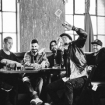Linkin Park have always been lumped in with the nu-metal crowd, which makes sense on a musical level given their blend of metal, rap and catchy rock choruses. However, Chester Bennington's introspective lyricism was always a far-cry from the rough-and-tumble bravado that came to define nu-metal's cultural affect, and in a new interview with Vulture, co-vocalist Mike Shinoda spoke about why Linkin Park felt isolated from the "tough-guy shit" that so many of their nu-metal peers specialized in.
The majority of the discussion focused on the 20th anniversary of Linkin Park's smash second album, Meteora, but early on in the chat, Shinoda talked about the era of Linkin Park before they were signed to a major label, and why music industry bigwigs thought their more nuanced take on nu-metal wouldn't be commercially viable.
"Here's what I assume they thought," Shinoda said of record label's initial hesitancy toward what they were building. "Our thing, the combination of elements, was too esoteric. We loved DJ Shadow, Fatboy Slim, Moby, Aphex Twin, and Portishead. I'm missing a ton … the Prodigy. With that stuff in the music, labels were like, 'Who's going to listen?'
"And then on top of it, we were more introspective. What we didn't like about what was going on in the scene was that it was very frat rock. It was toxic masculinity. We didn't know the term yet. We just didn't like how everything was about tough-guy shit, and we didn't identify with tough-guy shit. So nobody wanted to sign us because we didn't fit. They couldn't see us onstage. Somebody said to me, 'If you guys were to open up a show with Kid Rock or Limp Bizkit, you'd get beat up.' It was a joke, right? But probably true, at least for me. I would've gotten beat up. Chester wouldn't have gotten beat up. He'd fuck somebody up, too."
Obviously, the industry skepticism looks ludicrous in hindsight, given Linkin Park's first two albums and their many follow-ups went on to sell millions of copies, cementing them as one of the biggest rock bands in the world. And crucially, they got there on their own terms, by writing songs that people forged deeply intimate connections with, which Shinoda said was always their intention.
"I think that was the point," Shinoda commented. "It was always the point. While I loved and I grew up on very macho hip-hop, I was also, at that phase in my life, finishing college, more in tune with a more complex palette of subject matter in what I was listening to. I wanted to put that into my songs, like bands like Depeche Mode and Nine Inch Nails did. I was listening to a lot of U2. None of those are, like, 'Hey, I'm going to kick your ass' songs. Those are all, 'Oh, I got ass my kicked. This isn't fair or this feels bad or maybe it's my fault.'
"We weren't hearing those emotions as much in music that was out there. And when we did hear it, I liked what I was hearing. I should give groups like Deftones and Korn more credit. They were doing that. I liked how Jonathan Davis was just an open book putting all of his most fucked-up stuff right out there in the lyrics."











